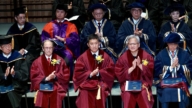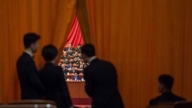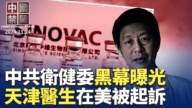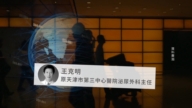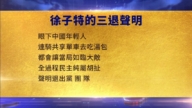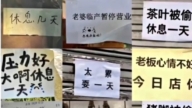【新唐人2014年07月11日訊】7月9號到10號,第六輪「美、中戰略與經濟對話」,和第五輪「中、美人文交流」高層磋商在北京舉行。中方有中共領導人習近平致開幕辭,美方有國務卿克里參與。雙方在大量關鍵問題上各持己見,對這次美、中對話國際媒體評價認為,缺乏實質性的結果。讓我們一起去聽聽專家們的解讀。
習近平開幕詞的題目是「努力搆建中、美新型大國關係」。美國國務卿克里在9號的發言中說:「我認為,新型大國關係不能只靠語言來界定,而是應該由行動來界定。」
習近平在開幕式上首次點明:「中、美對抗對兩國和世界肯定是災難」。
美國雜誌《中國事務》總編輯伍凡:「談了兩年沒有任何進展,現在反而『搞對抗變成災難』了,可見這個問題是向惡化走,不是向正面走。『災難』過去從來沒有用過。它已經遇到了美國對它施加非常大的壓力,它就認為有對抗的可能性了嘛,所以才講是災難了。」
這次「美、中戰略與經濟對話」的重點議題,有貨幣改革、朝鮮問題和雙邊投資協定等。
旅美時事評論員藍述認為,對比前蘇聯和西方民主國家「針鋒相對」的「冷戰型」關係,中共現在所熱衷的所謂美、中新型大國關係,最大的不同就在於利益上的「你中有我、我中有你」,北京最根本的目地是要維護政權。
旅美時事評論員藍述:「中共它在價值體繫上它不可能和西方談到一塊去,這是毫無疑問。那麼在這種情況之下,中共它所謂的新型大國關係,就是通過讓利——向西方的國家輸送利益。從而讓西方國家不在人權、價值問題上去指責中共。它就在很大程度上降低了來自於西方的這些對中共的壓力。」
不過,美國官員會後透露,雙方在領土主權爭議上各持己見。克里認為,中方犧牲區域和諧穩定,來解決領土主權問題,是無法接受的。但中方並不讓步。另外,在人民幣匯率的問題上,美國財長雅各布•盧表示,人民幣匯率由市場決定,這對中國經濟發展很重要,而中共副總理汪洋提出,金融改革需要掌握適當速度。
除此之外,中方期待美、中加強反恐合作,加速雙邊投資條約的談判﹔美國則希望中國放鬆管制,讓美國公司在華有更公平的競爭環境。
世界媒體大量報導這次會談。《路透社》評價:「這種年度會談已經進入第五個年頭。至今為止,會談沒有達成多少實質性的協議。」
美國雜誌《中國事務》總編輯伍凡看到現在美、中兩國,無論在經濟、環境、能源和人權等方面,雙方都不肯放棄基本利益。他認為,雙方做不到超越意識形態的不同,真正結成新型大國關係。
伍凡:「中共不可能放棄它的底限——共產黨專政。中共所謂新型大國的關係就是:我的核心力量你不能碰的,這是第一﹔第二我北京想要的你美國一定要給我,不給那就不是新型大國關係。就是『我的是我的,你的也是我的』。」
美國《彭博新聞社》針對中方所期待的「新型大國關係」說:「這種公開的宣言,跟雙方日益戒備彼此的戰略意圖和戰術等各種跡象成對比。」「中國擔心歐巴馬政府推行外交政策再平衡,將戰略重心向亞洲轉移,目地是遏制中國在亞太地區日益增長的影響力。」
北京去年11月在有爭議的海域上宣佈成立「東海防空識別區」,並在南中國海建起石油鑽井平臺。
《彭博》表示,中共當局認為,中國與日本和菲律賓有海洋權爭議的時候,美國偏向它的這兩個盟國。
另外,美、中雙方的疑慮還包括﹕美國在5月起訴了5名中共軍官,指控他們通過電腦網絡盜竊美國的商業機密。而中共取消了原定於本週舉行的網絡安全會議。
採訪編輯/唐音 後製/陳建銘
U.S.-China Dialogue Regarding New Relationship Model
he Sixth Round of U.S.-China Strategic and Economic
Dialogue (S&ED) and the Fifth Round of High-Level
Consultation on People-to-People Exchange (CPE)
took place in Beijing on July 9 and 10.
Communist regime leader Xi Jinping delivered the opening
statement with U.S. Secretary of State John Kerry.
The two sides disagreeon a number of key issues.
International media criticized the lack
of substantive dialogue.
Let’s hear the experts’ analyses.
In his opening remarks, Chinese leader Xi Jinping forged
a new bilateral model for China-U.S. relationship.
The U.S. Secretary of State Kerry responded: “I would say
to you that a new model is not defined in words.
It is defined in actions."
“etween China and U.S. will
definitely be a disaster for the two countries and the world."
China Affairs magazine editor-in-chief Chris Wu:
“There has been no progress in talks for two years.
Now he is proposing that the confrontation
will become a disaster.
That shows it’s deteriorating rather than moving forward.
This is the first time ‘disaster’ was mentioned.
The great pressure from the U.S. side is likely to cause
the confrontation. That’s why he’s talking about disaster."
The annual talks were expected to focus on Chinese currency,
maritime disputes, and an investment agreement.
Commentator Lan Su compared the Cold War between
the U.S. and the former Soviet Union to the New Model
between the U.S. and China.
He believes the main difference is Beijing’s fundamental
purpose is to secure the interests of the regime.
Lan Su: “There is no doubt that Communist China’s values
do not fit in with Western values.
The so-called new model is built on providing the economic
advantage to the West so that the West will keep silent
on human rights and value abuse of the Communist regime.
In a way, it largely reduces the pressure on the CCP
coming from the West."
However, the U.S. officials later said the two sides disagreed
on the territorial sovereignty.
Kerry does not believe in solving territory issues
by sacrificing the peace and stability of the region.
But China does not budge.
In addition, Secretary of Treasury Jacob Lew mentioned
that moving to a market-determined exchange rate
will be a crucial step.
However, when it comes to financial reform, Chinese Vice
Premier Wang Yang stated that China has to pace itself.
Xi said China expects increased cooperation regarding
the fight against terror and accelerated negotiation
on a bilateral investment treaty to promptly solve the matter.
The United States wants China to relax control, which would
contribute to more fair play for U.S. companies in China.
Reuters commented, “The annual talks, now in their fifth
year, have yielded few substantive agreements."
Chris Wu does not believe U.S. and China will be able to
bypass their ideological differences and reach this new model
because neither will give up on their fundamental interests
in economy, environment, resources and human rights.
Chris Wu: “The CCP will not give up its bottom line –
the communist dictatorship.
Its so-called new model between the two largest economic
powers is, ‘One, do not touch my core strength;
Two, the U.S. must grant everything Beijing wants.’
That’s what this new model is about,
i.e., everything is mine and my way."
Bloomberg commented on this so-called new model saying,
“Such public pledges contrast with signs of increasing
wariness of each other’s strategic intentions and tactics."
“China is concerned that the Obama administration’s
foreign-policy rebalancing toward Asia is aimed
at thwarting China’s growing influence in the region."
Last fall, China established an air-defense identification zone
and built oil rig in the South China Sea.
Bloomberg added, “China has criticized the U.S. for favoring
Japan and the Philippines over China on maritime territorial
disputes in the South and East China seas."
In addition, “the U.S. in May indicted five Chinese military
officers for computer theft of trade secrets, whereas China
canceled cybersecurity talks due this week."
Interview & Edit/TangYin Post-Production/Chen JianMing


